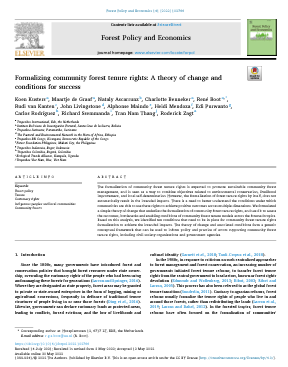Resource information
The formalization of community forest tenure rights is expected to promote sustainable community forest management, and is seen as a way to combine objectives related to environmental conservation, livelihood improvement, and local self-determination. However, the formalization of forest tenure rights by itself, does not automatically result in the intended impacts. There is a need to better understand the conditions under which communities are able to use these rights to achieve positive outcomes across multiple dimensions. We formulated a simple theory of change that underlies the formalization of community forest tenure rights, and used it to assess the outcomes, bottlenecks and enabling conditions of community forest tenure models across the forested tropics. Based on this analysis, we identified ten conditions that need to be in place for community forest tenure rights formalization to achieve the intended impacts. The theory of change and associated conditions form a generic conceptual framework that can be used to inform policy and practice of actors supporting community forest tenure rights, including civil society organizations and government agencies.

